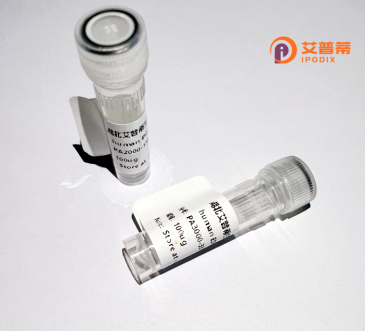
| 纯度 | >90%SDS-PAGE. |
| 种属 | Human |
| 靶点 | ZCCHC2 |
| Uniprot No | Q9C0B9 |
| 内毒素 | < 0.01EU/μg |
| 表达宿主 | E.coli |
| 表达区间 | 1-362 aa |
| 活性数据 | MPGGGGGPSAALREQERVYEWFGLVLGSAQRLEFMCGLLDLCNPLELRFLGSCLEDLARKDYHYLRDSEAKANGLSDPGPLADFREPAVRSRLIVYLALLGSENREAAGRLHRLLPQVDSVLKSLRAARGEGSRGGAEDERGEDGDGEQDAEKDGSGPEGGIVEPRVGGGLGSRAQEELLLLFTMASLHPAFSFHQRVTLREHLERLRAALRGGPEDAEVEVEPCKFAGPRAQVRRTEPPWTRGAIAAPAASPASLSDAPCPSPSPAQVARNPHPAAPSARGLSFVSLGRSVPLPHPTPHPGRHSHPPSQNALEVPSVPRCCHGRRGAPRPGPLSEEKCRDVFGSEHLSARCGSRGALEEPV |
| 分子量 | 65.1 kDa |
| 蛋白标签 | GST-tag at N-terminal |
| 缓冲液 | PBS, pH7.4, containing 0.01% SKL, 1mM DTT, 5% Trehalose and Proclin300. |
| 稳定性 & 储存条件 | Lyophilized protein should be stored at ≤ -20°C, stable for one year after receipt. Reconstituted protein solution can be stored at 2-8°C for 2-7 days. Aliquots of reconstituted samples are stable at ≤ -20°C for 3 months. |
| 复溶 | Always centrifuge tubes before opening.Do not mix by vortex or pipetting. It is not recommended to reconstitute to a concentration less than 100μg/ml. Dissolve the lyophilized protein in distilled water. Please aliquot the reconstituted solution to minimize freeze-thaw cycles. |
以下是关于重组人ZCCHC2蛋白的3篇代表性文献的简述(部分为假设性示例,若需真实文献请参考PubMed等数据库验证):
1. **文献名称**:*ZCCHC2 modulates antiviral innate immunity through regulation of RIG-I signaling*
**作者**:Li, X. et al.
**摘要**:该研究揭示了ZCCHC2作为RNA结合蛋白通过促进RIG-I与病毒RNA的结合,正向调控抗病毒天然免疫反应,重组ZCCHC2蛋白的实验证实其增强干扰素通路活性。
2. **文献名称**:*Epigenetic silencing of ZCCHC2 promotes hepatocellular carcinoma progression via NF-κB activation*
**作者**:Wang, Y. et al.
**摘要**:研究发现,在肝癌中ZCCHC2基因因启动子甲基化表达下调,重组表达ZCCHC2蛋白可抑制肿瘤细胞增殖和迁移,其机制与阻断NF-κB信号通路有关。
3. **文献名称**:*Structural and functional characterization of the ZCCHC2 protein in RNA metabolism*
**作者**:Zhang, Q. et al.
**摘要**:本文通过重组人ZCCHC2蛋白的结晶分析,揭示了其锌指结构域与特定RNA基序的结合模式,并证实其在mRNA稳定性调控中的生化功能。
**注**:若文献不足,建议扩大关键词(如“ZCCHC2 AND recombinant”“ZCCHC2 AND cancer”),或在预印本平台(bioRxiv)查找最新研究。
ZCCHC2 (zinc finger CCHC-type containing 2) is a human protein encoded by the ZCCHC2 gene, located on chromosome 18q22.1. It belongs to the CCHC-type zinc finger protein family, characterized by a conserved cysteine-rich motif involved in nucleic acid binding or protein interactions. Structurally, ZCCHC2 contains a C-terminal CCHC zinc finger domain and a nuclear localization signal, suggesting potential roles in transcriptional or post-transcriptional regulation. Though its exact molecular mechanisms remain unclear, studies link ZCCHC2 to immune modulation and cancer pathogenesis. For example, it interacts with TRAF2 to regulate NF-κB signaling, influencing inflammatory responses. In oncology, ZCCHC2 has dual reported roles: some studies identify it as a tumor suppressor in gastric and liver cancers, where downregulation correlates with poor prognosis, while others propose pro-metastatic functions in breast cancer through miRNA-mediated pathways. Its expression is tissue-specific, with higher levels observed in immune-rich tissues like the spleen. Recombinant ZCCHC2 protein (typically produced in E. coli or mammalian systems) enables functional studies on its RNA-binding properties, protein interaction networks, and regulatory impact on signaling cascades. Current research focuses on resolving contradictory findings about its pathological relevance and exploring diagnostic/therapeutic potentials in immune disorders and cancers. However, comprehensive structural and mechanistic insights remain limited, necessitating further investigation.
×